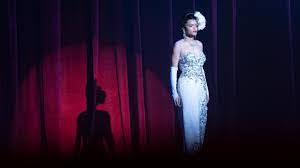DAMAGED FRUIT (THE UNITED STATES VERSUS BILLIE HOLIDAY)
Lee Daniels' 'The United States versus Billie Holiday' is a deeply frustrating film.
It features a barnstorming Golden Globe winning performance from the singer songwriting actress Andra Day.
And yet... it never quite wins you over.
Originally intended for a theatrical release from Paramount Pictures, it has wound up being distributed, thanks to the Covid lockdown, on Hulu in the United States and on Sky Cinema/Now TV in the UK and Ireland.
Based on the British Swiss journalist Johann Hari's 'Chasing the Scream: The First and Last Days of the War on Drugs,' it wallows in the misery of the legendary jazz and swing singer Billie Holiday's heroin addiction and dysfunctional relationships.
But it is mostly concerned with institutional racism, with the FBI accused of using the war against drugs as a means to pressure Holliday into no longer performing her iconic anti-lynching anthem, 'Strange Fruit'.
At the start of Daniels' film, Andra Day's Holiday is being interviewed about her life by Leslie Jordan's patronising Reginald Lord Devine who cannot understand why she persisted in singing a song which upset the American establishment.
However we soon see Garrett Hedlund's FBI narcotics agent Harry J Anslinger in an unconvincingly stagey scene vowing to take down Holiday because of the song, with his FBI superiors egging him on to nail her on drugs charges.
Anslinger deploys Trevante Rhodes' War veteran turned agent Jimmy Fletcher to go undercover as a Holiday fan and woo her in a bid to find the right moment to publicly expose her drug addiction.
Fletcher goes to her nightclub gigs and eventually catches her eye, turning up at her dressing room door.
Holiday, however, is in an abusive marriage to Erik La Rae Harvey's James Monroe.
However initially charmed by Fletcher, she is eventually betrayed by him and busted for drugs.
Anslinger is congratulated by his bosses after she is jailed for one year.
Banned from receiving a licence to sing in New York's nightclubs, Holiday performs to a sold out Carnegie Hall on her release.
She also falls under the spell of Tone Bell's nightclub owner John Levy who marries her and promises to get her card back.
However the relationship is also abusive and, while on the road in San Francisco, he plants drugs on Holiday in a bid to have her convicted at the behest of Anslinger for a second time.
She manages to beat the rap after Jimmy Fletcher takes the stand in the subsequent court case and alleges it was a set up.
Fletcher, who had been Anslinger's golden agent while working alongside African American colleagues in a segregated FBI office, is dispatched instead to follow Holiday on the road as she tours the US.
It is very clear that Anslinger and his FBI superiors are not primariky interested in Holiday's drugs habit.
They are determined to suppress the singing of 'Strange Fruit' and, as a result, Jimmy's loyalties are tested.
Daniels and his screenwriter Suzan-Lori Parks follow the mould of the traditional flawed showbiz icon biopic.
Day is given plenty of moments to shine as the drug addled and often abused star and, in many respects, this is no different to Rupert Goold's 'Judy,' which netted Rene Zellweger a Best Actress Oscar last year.
Daniels' film unquestionably wallows more in the misery of Holiday's addiction and her string of abusive relationships.
However, like Goold's film, the lead performance overshadows everything else and most of the supporting roles just seem too thinly sketched.
Rhodes does a decent enough job with his part as a conflicted FBI agent.
However Headlund, who has proven in the past he is a decent actor, is saddled with a very one dimensional baddie in a suit role.
He may as well wander around the film with a sandwich board that says 'corrupt racist law enforcer onscreen' as there is no subtlety to the way he is written.
Similarly, La Rae Harvey, Bell and Rob Morgan who depicts Holiday's second husband, Louis McKay are lumbered with stock roles as bad eggs and we struggle to see what attraction they have.
As for Holiday's band, Tyler James Williams also gets little to do as the accomplished saxophonist Lester Young, while Melvin Gregg's gets to scowl as her trumpeter.
Da'Vine Joy Randolph is better value as Holiday's eye patch wearing friend Roslyn and Miss Lawrence is competent enough as the singer's stylist Miss Freddy.
Jordan camps it up as Holiday's starstruck, yet condescending interviewer in what turns out to be a clunky narrative device.
Natasha Lyonne, however, is sadly underused as the stage and screen actress Tallulah Bankhead who was suspected of having an affair with Holiday.
Daniels' film is handsomely shot by the English cinematographer Andrew Dunn.
It also benefits from Paolo Nieddu's costumes, Daniel T Dorrance's sharp production design and Felix Lariviere-Charron's art direction.
But the stylish visuals and Day's impressive lead performance only add to the sense of frustration at the inadequacies of Parks' script which only hits half of its targets.
To her credit, Andra Day more than holds her own against Diana Ross' Best Actress Oscar nominated depiction of Holiday in Sidney J Furie's 1972 biopic 'Lady Sings The Blues'.
She certainly carries off performances of classic Lady Day songs like 'All of Me,' 'God Bless the Child' and 'Strange Fruit' with impressive ease.
Daniels' lead also does plenty to suggest in her debut role that she could well go on to become a major star in film.
If she were to land a Best Actress nomination in this year's Academy Awards on the back of her surprise Golden Globe triumph for Best Actress in a Drama, it would be hard to begrudge her.
After all, Zellweger romped home with the statuette last year in a much more vanilla biopic.
One of the most shocking things about Daniels' film, however, is the revelation in the opening credits that the US Senate considered a Bill outlawing lynching in 1937 which it did not pass.
At the end of the film, the director manages to hit home the message about institutional racism by telling us in the final credits that in February 2020 the US Senate considered the Emmet Till anti-lynching Bill.
It has yet to pass anti-lynching legislation.
This sentence hits home harder, however, than anything in Daniels' messy, rambling movie.
That is a damn shame because it really shouldn't be that way.
With a more disciplined script, Daniels could have landed his punches more effectively.
Instead, we are left with an uneven affair that without Day would fade from memory.
Holiday deserves better.
('The United States versus Billie Holiday' was released on Hulu in the US and on Sky Cinema and Now TV in the UK and Ireland on February 26, 2021)











Posting Komentar untuk "DAMAGED FRUIT (THE UNITED STATES VERSUS BILLIE HOLIDAY)"